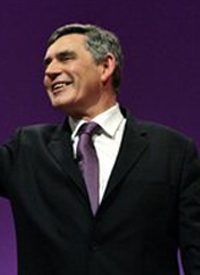
In the midst of the hubbub in Washington over the proposed $700 billion congressional bailout, British Prime Minister Gordon Brown is arriving in the United States this week along with Chancellor of the Exchequer Alistair Darling to promote a long-term international solution: a new global regime for managing the world’s finances. In a speech to Labor Party members on Monday, Darling drew the tedious and inevitable parallels between the financial crisis and other global problems: “Just as one government alone cannot combat global terrorism, just as one government alone cannot combat climate change, so one government alone cannot deal with the consequences of globalisation.”
What Brownand Darling will propose, according to an article in the British newspaper The Guardian, is “a stronger international regulatory system, based around an early-warning system run by the IMF.” They will be traveling to the United States and Europe over the next few weeks in order to “create an international consensus for a tougher global system of regulation.”
Prime Minister Brown independently confirmed his commitment to the new plan, telling Labor Party members in Manchester on Tuesday that “global standards and supervision” are now urgently needed “because the flows of capital are global, then supervision can no longer just be national but has to be global [sic].”
What Brown, Darling, and doubtless many other members of the globalist coterie are contemplating is nothing less than a global financial ministry — to complement the global trade ministry, the WTO, already in place — that will supervise and regulate the activities of central banks, including the Federal Reserve, as well as all international financial and banking activities. To be sure, elements of an international financial regime are already in place with the Bank of International Settlements and the International Monetary Fund, but these organizations have no ultimate international statutory authority over how banks, investment funds, or governments may choose to conduct their financial affairs. While the details of the Brown-Darling proposal have not been made public, it is easy to envisage a new global authority with ultimate control over the global money supply, with regulatory oversight over all international public and private financial activities, and with the power to shut down or bail out any bank or other financial corporation at any time.
Just as America effectively surrendered her sovereignty over trade more than a decade ago with the creation of the WTO, so now she is in very real danger of losing her financial independence, with the unprecedented global financial turmoil the useful pretext.



